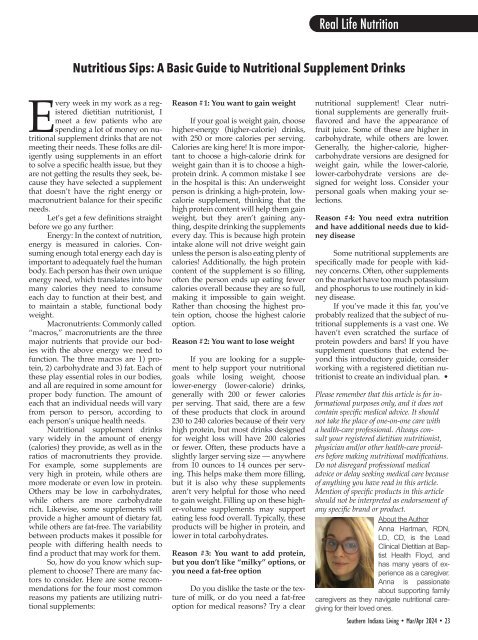Southern Indiana Living - March / April 2024
The March/April 2024 issue of Southern Indiana Living
The March/April 2024 issue of Southern Indiana Living
Create successful ePaper yourself
Turn your PDF publications into a flip-book with our unique Google optimized e-Paper software.
Real Life Nutrition<br />
Nutritious Sips: A Basic Guide to Nutritional Supplement Drinks<br />
Every week in my work as a registered<br />
dietitian nutritionist, I<br />
meet a few patients who are<br />
spending a lot of money on nutritional<br />
supplement drinks that are not<br />
meeting their needs. These folks are diligently<br />
using supplements in an effort<br />
to solve a specific health issue, but they<br />
are not getting the results they seek, because<br />
they have selected a supplement<br />
that doesn’t have the right energy or<br />
macronutrient balance for their specific<br />
needs.<br />
Let’s get a few definitions straight<br />
before we go any further:<br />
Energy: In the context of nutrition,<br />
energy is measured in calories. Consuming<br />
enough total energy each day is<br />
important to adequately fuel the human<br />
body. Each person has their own unique<br />
energy need, which translates into how<br />
many calories they need to consume<br />
each day to function at their best, and<br />
to maintain a stable, functional body<br />
weight.<br />
Macronutrients: Commonly called<br />
“macros,” macronutrients are the three<br />
major nutrients that provide our bodies<br />
with the above energy we need to<br />
function. The three macros are 1) protein,<br />
2) carbohydrate and 3) fat. Each of<br />
these play essential roles in our bodies,<br />
and all are required in some amount for<br />
proper body function. The amount of<br />
each that an individual needs will vary<br />
from person to person, according to<br />
each person’s unique health needs.<br />
Nutritional supplement drinks<br />
vary widely in the amount of energy<br />
(calories) they provide, as well as in the<br />
ratios of macronutrients they provide.<br />
For example, some supplements are<br />
very high in protein, while others are<br />
more moderate or even low in protein.<br />
Others may be low in carbohydrates,<br />
while others are more carbohydrate<br />
rich. Likewise, some supplements will<br />
provide a higher amount of dietary fat,<br />
while others are fat-free. The variability<br />
between products makes it possible for<br />
people with differing health needs to<br />
find a product that may work for them.<br />
So, how do you know which supplement<br />
to choose? There are many factors<br />
to consider. Here are some recommendations<br />
for the four most common<br />
reasons my patients are utilizing nutritional<br />
supplements:<br />
Reason #1: You want to gain weight<br />
If your goal is weight gain, choose<br />
higher-energy (higher-calorie) drinks,<br />
with 250 or more calories per serving.<br />
Calories are king here! It is more important<br />
to choose a high-calorie drink for<br />
weight gain than it is to choose a highprotein<br />
drink. A common mistake I see<br />
in the hospital is this: An underweight<br />
person is drinking a high-protein, lowcalorie<br />
supplement, thinking that the<br />
high protein content will help them gain<br />
weight, but they aren’t gaining anything,<br />
despite drinking the supplements<br />
every day. This is because high protein<br />
intake alone will not drive weight gain<br />
unless the person is also eating plenty of<br />
calories! Additionally, the high protein<br />
content of the supplement is so filling,<br />
often the person ends up eating fewer<br />
calories overall because they are so full,<br />
making it impossible to gain weight.<br />
Rather than choosing the highest protein<br />
option, choose the highest calorie<br />
option.<br />
Reason #2: You want to lose weight<br />
If you are looking for a supplement<br />
to help support your nutritional<br />
goals while losing weight, choose<br />
lower-energy (lower-calorie) drinks,<br />
generally with 200 or fewer calories<br />
per serving. That said, there are a few<br />
of these products that clock in around<br />
230 to 240 calories because of their very<br />
high protein, but most drinks designed<br />
for weight loss will have 200 calories<br />
or fewer. Often, these products have a<br />
slightly larger serving size — anywhere<br />
from 10 ounces to 14 ounces per serving.<br />
This helps make them more filling,<br />
but it is also why these supplements<br />
aren’t very helpful for those who need<br />
to gain weight. Filling up on these higher-volume<br />
supplements may support<br />
eating less food overall. Typically, these<br />
products will be higher in protein, and<br />
lower in total carbohydrates.<br />
Reason #3: You want to add protein,<br />
but you don’t like “milky” options, or<br />
you need a fat-free option<br />
Do you dislike the taste or the texture<br />
of milk, or do you need a fat-free<br />
option for medical reasons? Try a clear<br />
nutritional supplement! Clear nutritional<br />
supplements are generally fruitflavored<br />
and have the appearance of<br />
fruit juice. Some of these are higher in<br />
carbohydrate, while others are lower.<br />
Generally, the higher-calorie, highercarbohydrate<br />
versions are designed for<br />
weight gain, while the lower-calorie,<br />
lower-carbohydrate versions are designed<br />
for weight loss. Consider your<br />
personal goals when making your selections.<br />
Reason #4: You need extra nutrition<br />
and have additional needs due to kidney<br />
disease<br />
Some nutritional supplements are<br />
specifically made for people with kidney<br />
concerns. Often, other supplements<br />
on the market have too much potassium<br />
and phosphorus to use routinely in kidney<br />
disease.<br />
If you’ve made it this far, you’ve<br />
probably realized that the subject of nutritional<br />
supplements is a vast one. We<br />
haven’t even scratched the surface of<br />
protein powders and bars! If you have<br />
supplement questions that extend beyond<br />
this introductory guide, consider<br />
working with a registered dietitian nutritionist<br />
to create an individual plan. •<br />
Please remember that this article is for informational<br />
purposes only, and it does not<br />
contain specific medical advice. It should<br />
not take the place of one-on-one care with<br />
a health-care professional. Always consult<br />
your registered dietitian nutritionist,<br />
physician and/or other health-care providers<br />
before making nutritional modifications.<br />
Do not disregard professional medical<br />
advice or delay seeking medical care because<br />
of anything you have read in this article.<br />
Mention of specific products in this article<br />
should not be interpreted as endorsement of<br />
any specific brand or product.<br />
About the Author<br />
Anna Hartman, RDN,<br />
LD, CD, is the Lead<br />
Clinical Dietitian at Baptist<br />
Health Floyd, and<br />
has many years of experience<br />
as a caregiver.<br />
Anna is passionate<br />
about supporting family<br />
caregivers as they navigate nutritional caregiving<br />
for their loved ones.<br />
<strong>Southern</strong> <strong>Indiana</strong> <strong>Living</strong> • Mar/Apr <strong>2024</strong> • 23
















